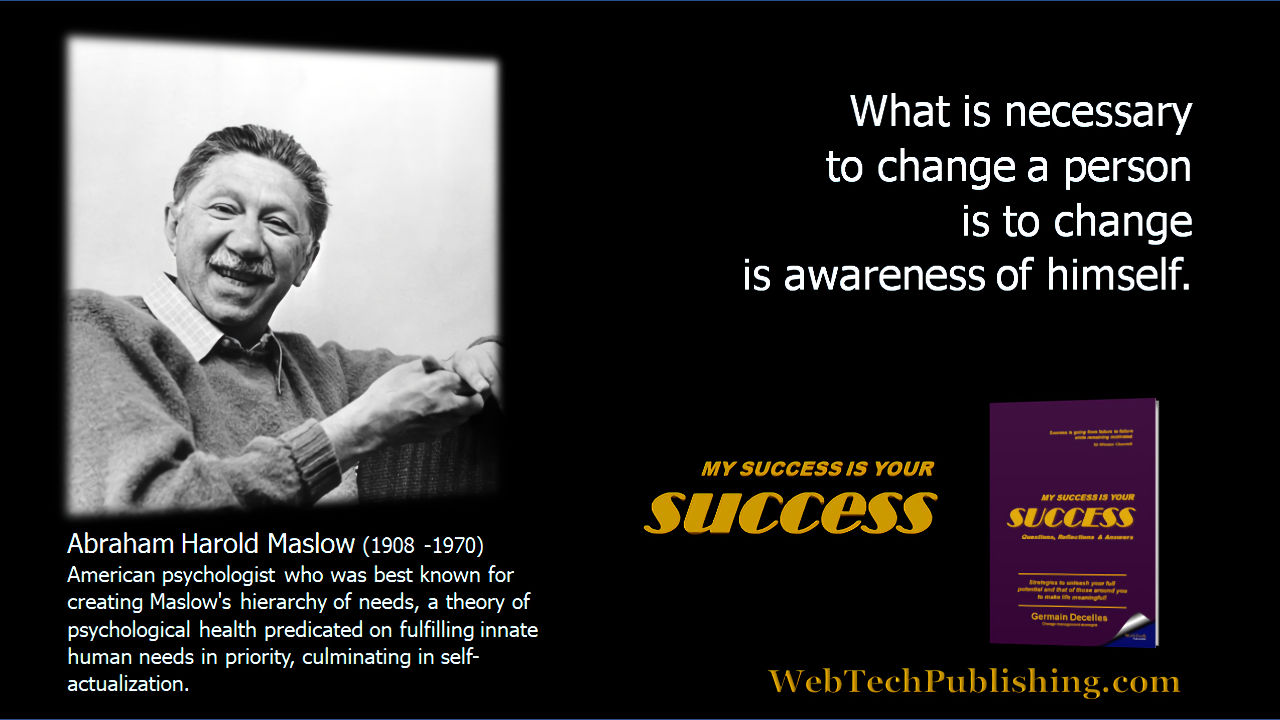|
Article published on LinkedIn.com: May 10 2023
11_needsoflife_100523_en.pdf

The quotations, short texts, and photographs in this
work remain the exclusive property of their respective
authors.
THE needs OF LIFE
To do this, let's look at Maslow's hierarchy of needs
theory. Abraham Maslow was a mid-20th-century
American psychologist working in the field of humanistic
psychology, who introduced the concept of self-realization,
highlighting our innate need for fulfillment.
According to Maslow's theory, an individual begins by focusing
on the lower order needs of physiology and safety.
A person who has just started their career will be more
concerned with physiological needs such as a stable income and
security needs. Once these basic needs are met, she or he will
now focus on social needs.
Once these needs are met, she or he will want to meet
higher-level needs such as self-esteem needs.
These needs are linked to the person's image and their desire
for respect and recognition from others. Even if the person
doesn't want to move into a higher role, they probably don't
want to continue doing the same job for their entire life.
Maslow's theory is based on five basic types of
needs. Often represented, as levels in a pyramid, the needs
residing in the lower levels must be satisfied before those of
the higher levels can be met.
1. Physical:
the need for air, water, food, sleep.
2. Security:
the need for security, shelter, stability.
3. Social:
the need for intimate relationships, to be
loved, to belong.
4. Self-esteem:
the need for self-esteem, prestige,
recognition of achievements.
5. Self-realization:
the need to develop, to be creative, to
realize one's full capacities.
The first four levels are considered
«
deficiency needs. » If we lack any of these levels, we can become
distracted, anxious, or depressed. If all these needs are met,
we are free to explore our « growth needs » or our unique
human need to grow as individuals.
1.
Physical Needs:
our biological needs
« air, water, food, shelter
»
are simple, but vital for survival, and when they are not met, put all
other needs on hold.
For instance,
you must take a lunch break, but you are delayed for half an
hour at the end of a meeting. Your body and brain react
biologically and emotionally to the need to eat.
When you are «
hungry » your ability to focus on your work steadily decreases
as the urgency to meet your hunger increases.
2.
Security needs: security can mean feeling physically secure, but it can also mean a
desire for stability, order, predictability, and control
regarding, for example, in the workplace, pay, working hours,
structures, team building, workload and performance
monitoring, to name a few.
All these circumstances lead to feelings of conflict,
instability, and a lack of confidence in the ability to meet
needs.
3.
Social needs: the ease with which we feel welcome in a group or in finding people «
like us » has a huge impact on our performance at work and in
life in general.
Feeling like
an outsider means, you're less likely to engage, offer ideas,
or go the extra mile for fear of being ridiculed.
When we feel
welcome, we are more likely to trust those around us and trust
ourselves to be ourselves. Our ideas and efforts are
validated, motivating us to do and be better.
If you can't
express yourself authentically and adapt to it, it may be
best, to leave the environment altogether.
The goal is
not to have everyone get along with each other all the time.
The important thing is to find harmony within your group while
allowing individuals to be themselves to form an engaged and
motivated group.
4.
Needs of self-esteem: when we learn to ride a bike, we start with training wheels for support
and balance. We build self-esteem by mastering this task.
Once we
mastered the technique, the training wheels come off and a
steady hand on the back of the seat helps us learn to balance
the bike while moving. Eventually, that hand lets go, and you
ride alone.
Like riding a
bicycle, to meet the needs of our ego both at work and
socially, we must develop self-esteem through an ability to
perform tasks independently.
We also need a
support system that helps us achieve our goal and a
recognition system that validates our accomplishments.
For example,
to motivate ourselves in this way at work, we need to look for
work that showcases our abilities while challenging us to
master new skills.
However, it is
suggested to place at the top of your list, the mastery of
observing the people around you as well as your communication
skills.
5.
Needs for self-realization: Maslow defined self-realization as the desire to «
become all that one is capable of becoming. »
The need for
self-realization
can materialize when you have
«
harnessed
» all the experiences and knowledge in each
circumstance, but you know that you can do more, and you can
do better. The awareness of this needs to grow comes to the
fore because all other needs have been met.
Free from
distractions, you can take a broad look at the sum of your
efforts and decide what really makes you feel fulfilled. This
level of freedom has its own motivating power, making it
easier for you or the people around you to take the next step
on a personal development journey.
To support this, find continuing education opportunities, higher-level
certifications, or resources that help pursue these passions.
Over time, you will recognize that your needs overlap or
change in importance based on individual circumstances.
Awareness and
constant communication around your needs and those of the
people around you are the essential component to meet these
needs, whatever their order.
Here we all need to remember
Dr. Maslow comment, « what is necessary to change a person is to change is awareness of
himself. »
Find out more about «
A meaningful life »
with My Success Is Your Success. The book through
questions, quotes and reflections provides the necessary
elements to explore all about motivation so to shape your
success and help those around you do the same. Remember that
success is all about team efforts!
|

|
This book is the result of forty years
of experience acquired with local and international
organizations and companies and during consultancy,
change management, transition and marketing services.
This 404-page
personal development book was published by WebTech
Publishing and is available online in English, North
American French and European versions. For more
information and to view the flip book, visit
webtechPublishing.
|
About the Author
Decelles
Other publications:
ISO Pour Tous
– Le manuel
d’information ISO – Le guide de préparation ISO – La
gestion du changement en affaires – La gestion de
projet d’affaires – Le
changement POUR TOUS –
Change your future,
now! – Mon succès est votre succès.
Press Contact
Germain Decelles, o.s.j.
WebTech Management et Publication Incorpored
|
 |
—30 —
|